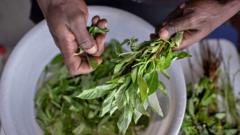An inquiry into the British Army's training base in Kenya found that some soldiers are continuing to engage with sex workers, contradicting the Army's ban. The investigation, which looked into conduct at the base for over two years, revealed that reports of "transactional sex" persist, highlighting the need for stronger measures to prevent exploitation.
Inquiry Reveals British Soldiers in Kenya Continue Use of Sex Workers Despite Ban

Inquiry Reveals British Soldiers in Kenya Continue Use of Sex Workers Despite Ban
A British Army investigation uncovers ongoing misconduct at the British Army Training Unit in Kenya, where soldiers are reported to be using sex workers despite a formal prohibition.
An investigation by the British Army has revealed that soldiers stationed at its training base in Kenya, known as the British Army Training Unit Kenya (Batuk), have continued to use sex workers, despite the army's explicit ban. The findings, detailed in a report, indicate that such activities occur at a "low to moderate" level and underscore the necessity for further interventions to eradicate the practice.
The inquiry, commissioned in October 2025 following unsettling media reports from ITV, scrutinized conduct at the base dating back to July 2022. Allegations of soldiers engaging with local sex workers led to heightened scrutiny, particularly after the unresolved death of Agnes Wanjiru in 2012, a Kenyan woman believed to have been murdered by a British soldier. Since Wanjiru's case, various concerns surrounding the conduct of troops at Batuk have emerged.
UK Chief of Defence Staff Gen Sir Roly Walker responded to the findings, emphasizing the army's commitment to halting sexual exploitation within its ranks. He stated, "Transactional sex is still happening in Kenya at a low to moderate level. It should not be happening at all." He firmly rejected the behavior, attributing it to preying on vulnerable individuals and highlighting that such actions contradict what it means to serve in the British Army.
The lengthy inquiry involved a four-member panel, including serving officers and an independent advisor, and assessed the situation over two years. The report identified at least 35 instances of suspected payments for sex since the army's guidance was issued in July 2022. The soldiers involved during this timeframe included 7,666 personnel. Notably, while prior training on the new regulations had preceded some reported instances, most allegations remained unproven.
Alongside these findings, the UK Foreign Office mentioned ongoing investigations into a few additional cases of soldiers allegedly utilizing sex workers, all occurring post-inquiry. The original report highlights that, despite the army's training and regulations aimed at preventing sexual misconduct, "transactional sexual activity" appears to persist, requiring the army to adopt a more protective stance against such behaviors.
Additionally, the army has committed to implementing the report's recommendations, which include making it easier to dismiss soldiers found guilty of engaging with sex workers and enhancing training protocols. These findings join a history of scrutiny over Batuk, initially spotlighted by a Sunday Times investigation in 2021 and compounded by allegations of poor treatment of local residents by British forces stationed there.
Local Kenyan MP inquiries have also raised concerns about soldiers' behavior, particularly regarding claims of injury to residents and situations involving soldiers fathering children with local women and subsequently abandoning them. In June 2023, a soldier stationed at Batuk faced repatriation to the UK following a rape accusation.
Despite the troubling revelations, the Service Inquiry noted that most local Kenyans express positivity about the presence of the Batuk camp, signaling a complex relationship between the British Army and the surrounding community. The inquiry's findings echo larger issues of military conduct abroad and the need for rigorous accountability and protection for vulnerable populations.


















